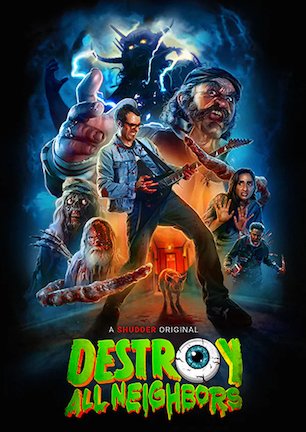Studio: Shudder
Director: Simone Scafidi
Writer: Manlio Gomarasca, Davide Pulici, Simone Scafidi
Producer: Giada Mazzoleni, Daniele Bolcato
Stars: Dario Argento, Fiore Argento, Floriana Argento, Marisa Casale, Michele Soavi, Lamberto Bava, Guillermo Del Toro, Gaspar Noe, Nicolas Winding Refn, Asia Argento
Review Score:
Summary:
Close collaborators, family members, and famous fans unpack the filmmaking legacy of Italian horror maestro Dario Argento.
Review:
A pessimist might call it a "problem." A glass half-full person might simply acknowledge it as the "current state of the scene." Whatever the POV, we appear to be at a point in the 21st century where younger documentarians make movies about longtime Hollywood heroes that are more like fanservice love letters than deep-diving retrospectives. There's certainly a place for celebratory sentimentality. It just helps to know ahead of time if you're getting an indispensable lesson in cinema history or a well-meaning, albeit puffy piece of starstruck idolatry, the latter of which is largely the case with "Dario Argento Panico," a cursory primer flicking so lightly at the maestro's storied career, it doesn't scratch the surface so much as glance off it.
Director Simone Scafidi, whose "Fulci for Fake" (review here) took on another titan of Italian horror, chooses a curious framing device for "Dario Argento Panico." Intercut with similar shots from Jessica Harper's rain-drenched cab ride to Tanz Academy, the film opens with Dario being driven to a hotel where, as text tells us, he will write his next movie. The "Suspiria" parallel suggests a sinister start, I guess? I'm not sure. I'm not sure Scafidi knows what he wanted to do either. Perhaps the plan was for something serendipitous to happen that never did. So after a series of static camera angles shows Argento's staged arrival at the location, "Panico" loosens the premise to the point where it falls off, with a quick cutaway to Dario jotting notes on an unspecified stack of paper being the only other glimpse into a writing process we never really get to gaze at.
Gazing from afar and guessing at context become prominent activities for viewers, and for some talking heads, throughout the movie. A mid-credits outtake depicts Argento griping through a grin that he had to talk for two hours. Someone off-camera corrects that length to 45 minutes as chuckles escalate. Meant to be an endearing moment, this scene simultaneously suggests Dario may have felt his participation was a bit of a chore, or something close to it, as candid offerings are in short supply no matter if the topic is his mother's photography career or familial fallout with his daughter Asia.
To compensate for how precious few minutes of fresh footage feature Argento, "Panico" piles on anecdotes from Dario's creative collaborators, family members, and famous filmmakers who don't have any more of a connection to Argento than just being fans. Of this last group, Guillermo Del Toro offers the most insight on Argento as a craftsman, pointing out how he uses architecture to express underlying evil in Italian locales, or how Dario creates fantastical settings where bizarre occurrences are accepted as normal. Gaspar Noe can't seem to make up his mind about how erotic Argento's films are or aren't. Bringing up the rear, Nicolas Winding Refn comes across as being in a different documentary, effusing eager praise for Argento that echoes generalities any average fan might express.
Scafidi could have made a more informative movie entirely out of daughter Asia Argento's recollections regarding her father, from the vantage of their personal relationship as well as their professional one. Understandably, given her status as Argento's daughter and frequently featured star, Asia goes further than anyone in discussing Dario like a human being as opposed to a revered colossus of unassailable artistry. Yet with the way she stops short whenever a sensitive subject creeps in, such as her half-sister's anorexia inspiring "Trauma" or Dario exhibiting rare emotion in a vulnerable moment, there's also the sense that no matter who speaks, "Panico" would never permit its spotlight to be too revealing, much less risk being unflattering. And given the relative reservedness on his own end, Dario Argento probably prefers it this way.
Along with how heavily the movie features people talking about Argento rather than Argento talking about himself, some of the archival footage feels included only because that's what was available. "Panico" presumably couldn't secure licensing for clips from many of Argento's films, so some projects are only represented by a still frame or two. Then when we do see Argento working briefly behind the scenes, we're left with trivial inclusions like watching Dario idly flip through paintings for "The Stendhal Syndrome."
In defense of the film's economical runtime of 90-ish minutes, only so much ground can be reasonably covered of a career that spans seven decades. But obsessives looking to hear more about obscure favorites will discover that, while the juiciest titles like "Suspiria" and "Opera" receive the lion's share of attention, entire periods of Argento's career are skipped over like they don't even exist.
My main measurement for any film of this nature involves gauging how much they inspire me to further explore the subject's work or to learn more about his/her/their life. Wanting to watch more Dario Argento should be an easy layup. Yet after some initial thoughts like, "Maybe I ought to revisit some of his early giallo" and "I have some gaps in his filmography that could use some filling in," any urgency to take either action faded due to the film's casualness. "Dario Argento Panico" is not poorly made, and it definitely has earnest intentions. Nevertheless, it's not a meal on its own; it's a low-calorie dessert topping for diehards who have already feasted plentifully on Dario Argento's filmography.
Review Score: 55







No matter what a viewer gets out of the movie, there’s an inescapable sense that its disparate parts are still missing key pieces.